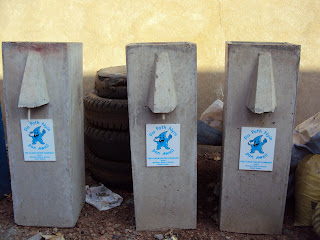 Logo for the water filter project
Logo for the water filter project Village women prepare seedbeds next to the clinic building
Village women prepare seedbeds next to the clinic building Village children get water at the clinic well
Village children get water at the clinic well
Our South Sudanese partner now has a formal legal structure in the country. William Kolong Pioth, its Managing Director, is a Sudanese Canadian who divides his time between two homes, Vancouver and Aweil. When he arrived in South Sudan in January for his most recent stay there, he went to the capital city, Juba, to arrange for the legal incorporation of the organization as a non-profit corporation called Pan Aweil Developments Inc.
The purposes of the organization, as stated in its articles of association are:
(1) To initiate, supervise and manage the development of small scale community projects in South Sudan, primarily in the areas of clean water supply, health care, education and agriculture.
(2) To maximize the participation of local people in the development and management of projects in their communities.
(3) To inform and educate local people in areas such as hygiene, sanitation, personal and family health care, food production and preparation, building construction and skills development.
(4) To provide project development consultancy services to other non-profit organizations.
(5) To attract and channel funding from domestic and international sources to projects and activities of the corporation.
(6) To strive to ensure that projects developed by the corporation become self-supporting within a reasonable period of time.
Pan Aweil Developments is now managing two projects that were begun in 2009. The first is the Pioth Thuc Guot Walk-In Clinic, located in Panlang village, just outside the town of Marial Bai in Aweil West County, Northern Bahr el Ghazal state, South Sudan.
Construction of the four-room clinic and a nearby drilled well were completed in 2009. Local villagers supplied the bricks and labour for the clinic building and a local contractor from Aweil town installed the well. Hanti Sidra One Global Family provided funding for the construction of the clinic and well, and purchased medical supplies for the clinic from Health Partners International, a Canadian NGO. Other medical equipment was donated by doctors in Burnaby BC.
Even before the clinic began operation, the building was being put to use by the community. A nearby primary school that, like many in South Sudan, has “classrooms” under trees, moved its classes under the broad roof of the clinic’s verandah on rainy days. In addition, community meetings were held on the verandah. The nearby well and another one installed by William about a half kilometre away are getting plenty of use by grateful villagers. Also, right next to the clinic building there is a small agricultural project. Village women have a nursery where they plant seedlings watered from the nearby well, then transplant them to their own fields. As this is being written, the management of the clinic is still in the process of being organized but its official opening is coming soon and it should be fully operational shortly.
The second project of Pan Aweil Developments is called The Clean Water Company. It manufactures and distributes biosand water filters. Clean drinking water was identified by villagers as their most critical need, with access to health care ranking second. The filters, designed in the early 1990s by David Manz, then an engineering professor at the University of Calgary, seem to be the perfect solution and they are now used widely throughout Africa, Asia and Latin America. The Centre for Affordable Water and Sanitation Technology (CAWST), based in Calgary, provides training, technical support, and research for the development of the filters. These concrete filters, with precise proportions of sand and gravel as the filtration media, are relatively easy to build and maintain. They eliminate 100% of parasites and over 95% of bacteria from water, as well as almost all suspended sediments and most organic and inorganic compounds. They are ideal for home use, providing about 60 litres of pure water per day. The Clean Water Company’s first production facility is now in operation in Panlang village, near to the clinic and well.
A third project that is a combination of, and spin off from, the first two is called “Bricks for Filters”. It is described in a separate post. In addition, Pan Aweil Developments is already receiving inquiries from a number of South Sudanese and external NGOs regarding management or consultancy services. For the moment it is concentrating on getting its initial projects up and running satisfactorily.
 William gives t-shirts from Canada to village children
William gives t-shirts from Canada to village children Children in their t-shirts head toward the new clinic
Children in their t-shirts head toward the new clinic The Hilux pickup truck promotes clean water
The Hilux pickup truck promotes clean water Sand for filters is loaded onto the Hilux, our indispensable "donkey"
Sand for filters is loaded onto the Hilux, our indispensable "donkey" New water filters with The Clean Water Company labels
New water filters with The Clean Water Company labels Baked bricks ready to be delivered to the building site
Baked bricks ready to be delivered to the building site William addresses the Bricks for Filters organizing committee
William addresses the Bricks for Filters organizing committee An outdoor classroom at Malweil Primary School
An outdoor classroom at Malweil Primary School


